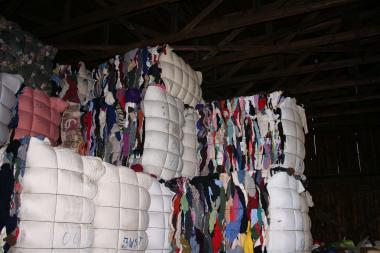Corona-virus pushes Used Textiles Industry into Struggle for Survival
The measures to reduce the propagation speed of the COVID-19 epidemic require hourly new and flexible adjustments to system processes and business agreements. In these difficult times, the waste textile companies rely on a close solution-oriented dialogue with their contract partners.
The initiatives presented a common vision for social protection and responsible entrepreneurship in this crisis at the end of April.
The members of the board of directors at bvse textile recycling raise the alarm because the economic starting point for companies in the sector pf used textile is getting worse every day.
"An increasing number of sorting systems are applying for short-time work due to the corona crisis or are closing the factories completely due to quarantine measures," Martin Wittmann, the bvse vice president and chairman of the bvse textile recycling association, describes the current situation.
The amount of used clothing collected in Germany is declining sharply in many regions along with increasing social distancing, existing or expected curfew and associated closings of collection points and civic amenity sites.
"It looks even bleaker on the sales side. In the meantime, measures ordered worldwide, such as curfews and ban on meetings, prevent the opportunities to even generate any revenue. Due to official orders, second-hand shops have to close everywhere, including in Eastern Europe. This means that the demand for used clothing dries up almost completely.
The African markets are also suffering from the corresponding lack of demand, due to the lack of funds available from local consumers.
The markets necessary for the sale of sorted goods have collapsed globally since mid-March 2020. It is currently not possible to market wearable second-hand clothing, but also products in the recycling and cleaning rag segment. Thus, there are currently no prospects for generating revenue in the end customer area.
Since the transit time of a piece of used textile from the collection to the sorting to the final marketing in one of the global markets can take up to four months, this situation will certainly take just as long because a positive change in the current overall pandemic situation cannot be assumed.
The waste disposal companies active in Germany in the field of used textiles are therefore currently concerned only with maintaining the operational structures in order to find ways at a later time to be able to fulfill the previous agreements.
"What we urgently need now are common, fair and economically sound solutions with all of our contractual partners so that both sides can survive this crisis. The situation in many municipal, charitable and private places currently looks like that we maintain the services of waste collection and recycling at high costs, but currently do not know whether we will be compensated for this due to force majeure,” stated Wittmann.
As a start, some companies in the industry have therefore already concluded agreements with municipalities. In return for a provisional suspension of payment obligations for the rental of container spaces or collected goods, the private companies want to do everything possible to ensure that the recycling of used clothes and cleaning of the collection points in the interest of the com-mon good, despite their own staff shortages and difficult conditions remains guaranteed.
“At the same time, we would like to appeal to everyone involved that there is understanding for late pick-ups and container empties caused by the crisis. We urge the citizens not to put any collectibles next to the containers. As long as we have enough staff, every container will be emptied,” promised Martin Wittmann, Vice President of the bvse.
bvse textile recycling association



